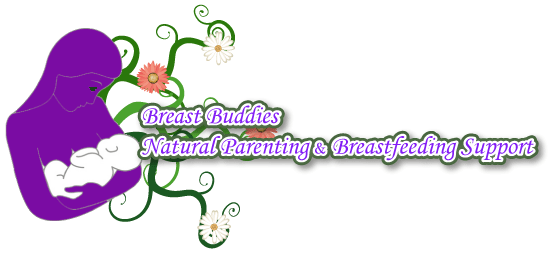Alcohol, caffeine and mother's milk
Breast Buddies Natural Parenting And Breastfeeding Support Forum. Attachment Parenting :: Breastfeeding, Pregnancy And Parenting Resources :: Breastfeeding and nutrition
Page 1 of 1
 Alcohol, caffeine and mother's milk
Alcohol, caffeine and mother's milk
Alcohol
Guidelines
In general, if you are sober enough to drive, you are sober enough to breastfeed. Less than 2% of the alcohol consumed by the mother reaches her blood and milk. Alcohol peaks in mom's blood and milk approximately 1/2-1 hour after drinking (but there is considerable variation from person to person, depending upon how much food was eaten in the same time period, mom's body weight and percentage of body fat, etc.). Alcohol does not accumulate in breastmilk, but leaves the milk as it leaves the blood; so when your blood alcohol levels are back down, so are your milk alcohol levels.
Always keep in mind the baby's age when considering the effect of alcohol. A newborn has a very immature liver, so minute amounts of alcohol would be more of a burden. Up until around 3 months of age, infants detoxify alcohol at around half the rate of an adult. An older baby or toddler can metabolize the alcohol more quickly.
Effects of alcohol on breastfeeding and the breastfed baby
from http://www.kellymom.com/health/lifestyle/alcohol.html
Caffeine
The American Academy of Pediatrics lists caffeine as an approved substance for use by breastfeeding mothers. This means that an occasional cup of coffee or caffeinated soft drink will not harm your baby. But it is important to understand that babies under 6 months of age have trouble metabolizing caffeine. If mom drinks too much caffeine it can cause a build up in the baby’s body. This may make your baby irritable or interfere with sleep. One study found that the iron content of milk was reduced in moms who were heavy coffee drinkers. Check with your doctor to see if any medications taken by you or your baby also contain caffeine. If they do, it may be best to avoid caffeine in other forms entirely until your baby is older.
References:
T. Hale. Medications and Mothers’ Milk (Tenth edition), Pharmasoft Publishing, Amarillo, 2002. Pg. 100-102.
Guidelines
- Current research says that occasional use of alcohol (1-2 drinks) is not harmful to the nursing baby. The American Academy of Pediatrics Committee on Drugs classifies alcohol (ethanol) as a “Maternal Medication Usually Compatible With Breastfeeding.”
- Many experts recommend against drinking more than 1-2 drinks per week.
- It is recommended that nursing moms avoid breastfeeding during and for 2-3 hours after drinking (Hale 2002).
- There is no need to pump & dump milk after drinking alcohol, other than for mom's comfort -- pumping & dumping does not speed the elimination of alcohol from the milk.
- Alcohol does not increase milk production, and has been shown to inhibit let-down and decrease milk production (see below).
- If you're away from your baby, try to pump as often as baby usually nurses (this is to maintain milk supply, not because of the alcohol). At the very least, pump or hand express whenever you feel uncomfortably full - this will help you to avoid plugged ducts and mastitis.
In general, if you are sober enough to drive, you are sober enough to breastfeed. Less than 2% of the alcohol consumed by the mother reaches her blood and milk. Alcohol peaks in mom's blood and milk approximately 1/2-1 hour after drinking (but there is considerable variation from person to person, depending upon how much food was eaten in the same time period, mom's body weight and percentage of body fat, etc.). Alcohol does not accumulate in breastmilk, but leaves the milk as it leaves the blood; so when your blood alcohol levels are back down, so are your milk alcohol levels.
Always keep in mind the baby's age when considering the effect of alcohol. A newborn has a very immature liver, so minute amounts of alcohol would be more of a burden. Up until around 3 months of age, infants detoxify alcohol at around half the rate of an adult. An older baby or toddler can metabolize the alcohol more quickly.
Effects of alcohol on breastfeeding and the breastfed baby
- Alcohol does not increase milk production. In fact, babies nurse more frequently but take in less milk in the 3-4 hours after mom has had a drink, and one study showed a 23% decrease in milk volume with one drink (Mennella & Beauchamp 1991, 1993; Mennella 1997, 1999).
- 2+ drinks may inhibit let-down (Coiro et al 1992; Cobo 1974).
- One study showed changes in the infant's sleep-wake patterning after short-term exposure to small amounts of alcohol in breastmilk -- infants whose mothers were light drinkers slept less (Mennella & Gerrish 1998).
- Daily consumption of alcohol has been shown in the research to increase the risk for slow weight gain in the infant.
- Daily consumption of alcohol (1+ drinks daily) has been associated with a decrease in gross motor development (Little et al 1989).
from http://www.kellymom.com/health/lifestyle/alcohol.html
Caffeine
The American Academy of Pediatrics lists caffeine as an approved substance for use by breastfeeding mothers. This means that an occasional cup of coffee or caffeinated soft drink will not harm your baby. But it is important to understand that babies under 6 months of age have trouble metabolizing caffeine. If mom drinks too much caffeine it can cause a build up in the baby’s body. This may make your baby irritable or interfere with sleep. One study found that the iron content of milk was reduced in moms who were heavy coffee drinkers. Check with your doctor to see if any medications taken by you or your baby also contain caffeine. If they do, it may be best to avoid caffeine in other forms entirely until your baby is older.
References:
T. Hale. Medications and Mothers’ Milk (Tenth edition), Pharmasoft Publishing, Amarillo, 2002. Pg. 100-102.

Kasia80-
 Number of posts : 4575
Number of posts : 4575
Age : 44
From : Oxfordshire
Tell us about yourself : \"If breastfeeding in public makes people uneasy because the breasts are considered sexual, then bottle-feeding must be the equivalent of whipping out a dildo\"
Your mood today : Happy
Thanks and Reputation points : 20
Points : 549
Registration date : 2007-08-04
 Similar topics
Similar topics» Happy Mothers day!
» Happy Mothers Day!!!
» Breast is best for mothers who use centres
» Survey of Mothers' Sleep & Fatigue
» British Government to Pay Breastfeeding Mothers!
» Happy Mothers Day!!!
» Breast is best for mothers who use centres
» Survey of Mothers' Sleep & Fatigue
» British Government to Pay Breastfeeding Mothers!
Breast Buddies Natural Parenting And Breastfeeding Support Forum. Attachment Parenting :: Breastfeeding, Pregnancy And Parenting Resources :: Breastfeeding and nutrition
Page 1 of 1
Permissions in this forum:
You cannot reply to topics in this forum